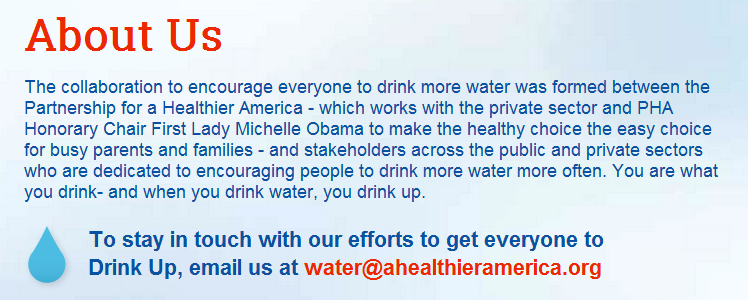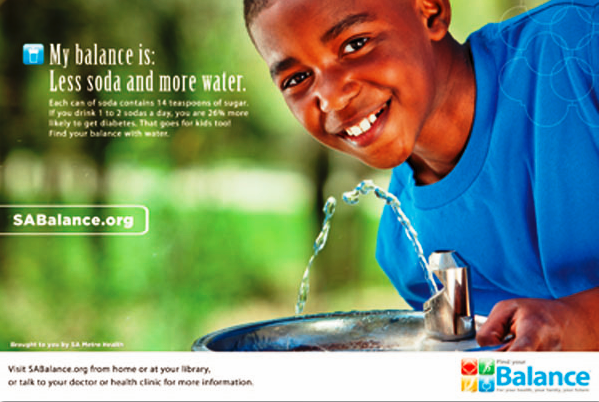Drink Up? The new Let’s Move! campaign
Michele Obama’s Let’s Move! campaign to end childhood obesity within a generation has taken on a new angle: Drink Up. It issued a press release yesterday urging Americans to drink more water.
The “Drink Up: You Are What You Drink” website explains:
Let me be absolutely clear: I am totally in favor of encouraging kids to drink water.
But:
- Water deficiency is not a public health problem in the United States. Childhood obesity is the problem.
- Drinking water will only help to counter childhood obesity if it substitutes for sugary sodas.
- Bottled water companies such as Dasani (owned by Coca-Cola) and Aquafina (PepsiCo), and their trade group The American Beverage Association (ABA), are the main supporters of this initiative.
- This makes the message sounds like “drink bottled water,” without much attention to environmental implications.
The ABA’s congratulatory press release says:
Staying hydrated is important to staying in balance, and bottled water provides people with a convenient and popular choice. By supporting this new initiative, our industry is once again leading with meaningful ways to achieve a balanced lifestyle.”
Hydrated? Not an issue for most people (exceptions—elite athletes, people at high altitude, the elderly).
Bottled water? In places with decent municipal water supplies, tap water is a much better choice; it’s inexpensive, non-polluting, and generates political support for preserving the quality of municipal water supplies. See, for example, what Food and Water Watch has to say about bottled water.
James Hamblin’s critical account in The Atlantic indicates that the press conference must have been tough going. Sam Kass, White House chef and executive director of Let’s Move! took the questions.
Another reporter: “Why aren’t we talking about obesity?”
Another reporter: Are we talking about replacing sugary drinks and sodas with water?”
Lawrence Soler, president and CEO of Partnership for a Healthier America, fielded that one. “It’s less a public health campaign than a campaign to encourage drinking more water. To that end, we’re being completely positive. Only encouraging people to drink water; not being negative about other drinks. “
I consider Let’s Move! to be a public health campaign, and a very important one.
Hamblin concludes:
I know we’re just trying to “keep things positive,” but missing the opportunity to use this campaign’s massive platform to clearly talk down soda or do something otherwise more productive is lamentable. Public health campaigns of this magnitude don’t come around every day…Keeping things positive and making an important point are not mutually exclusive, you fools.
My interpretation
Let’s Move! staff have stated repeatedly that they must and will work with the food industry to make progress on childhood obesity. I’m guessing this is the best they can do. Messages to “drink less soda” (or even “drink tap water”) will not go over well with Coke, Pepsi, and the ABA; sales of sugary sodas are already declining in this country.
I’m thinking that the White House must have cut a deal with the soda industry along the lines of “we won’t say one word about soda if you will help us promote water, which you bottle under lots of brands.” A win-win.
Isn’t drinking water better than drinking soda? Of course it is.
But this campaign could have clarified the issues a bit better. Jeff Cronin, communications director of the Center for Science in the Public Interest circulated a poster created by Rudy Ruiz (of the communications firm Interlex) for a public health campaign in San Antonio:
Public health partnerships with food and beverage companies—especially soda companies—are fraught with peril. Let’s hope this one conveys the unstated message like the one in San Antonio: My balance is less soda and more tap water.
Other resources
As always, Eddie Gehman Kohan writing at ObamaFoodorama provides a clear, detailed summary of the relevant details along with transcripts of Michele Obama’s remarks at the launch in Watertown, Wisconsin (site of a Pepsi bottling plant, among other things).
Amanda Chin has a good piece in the Huffington Post (I’m quoted).



